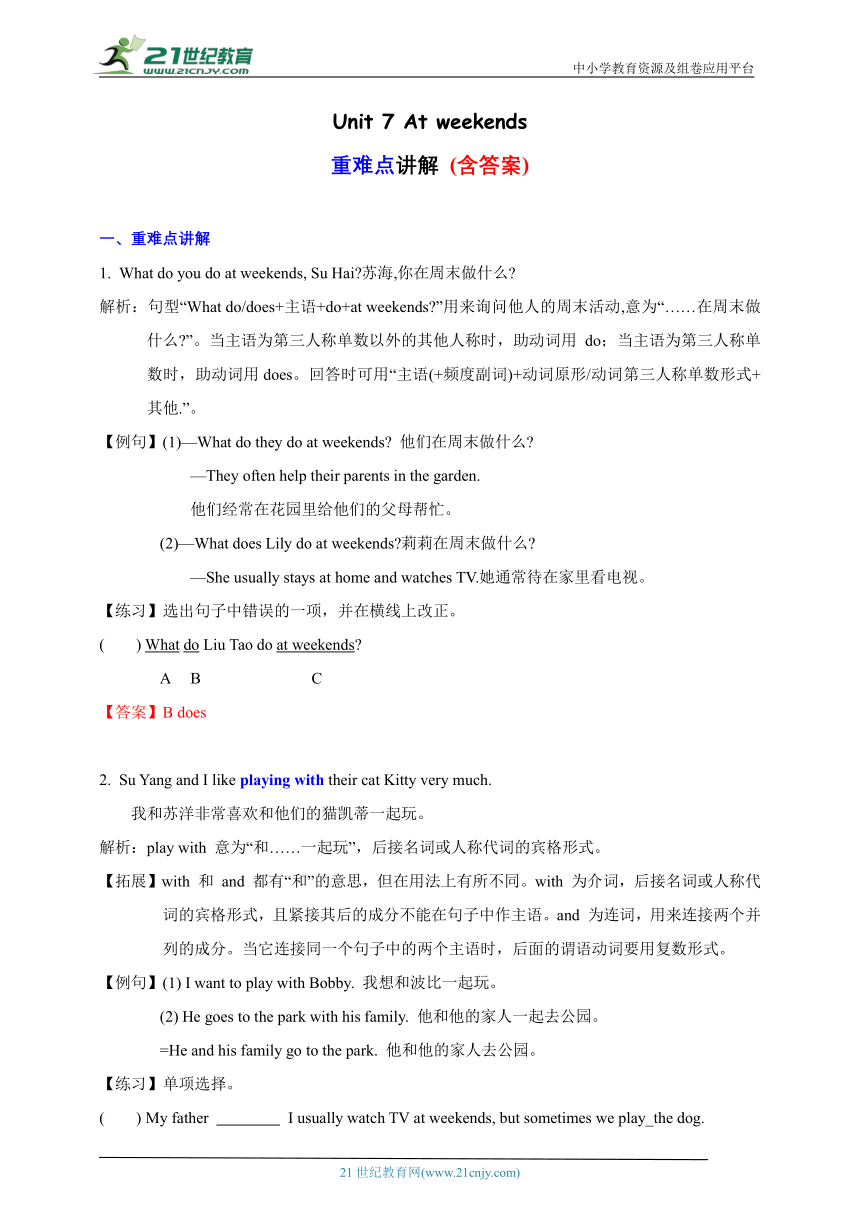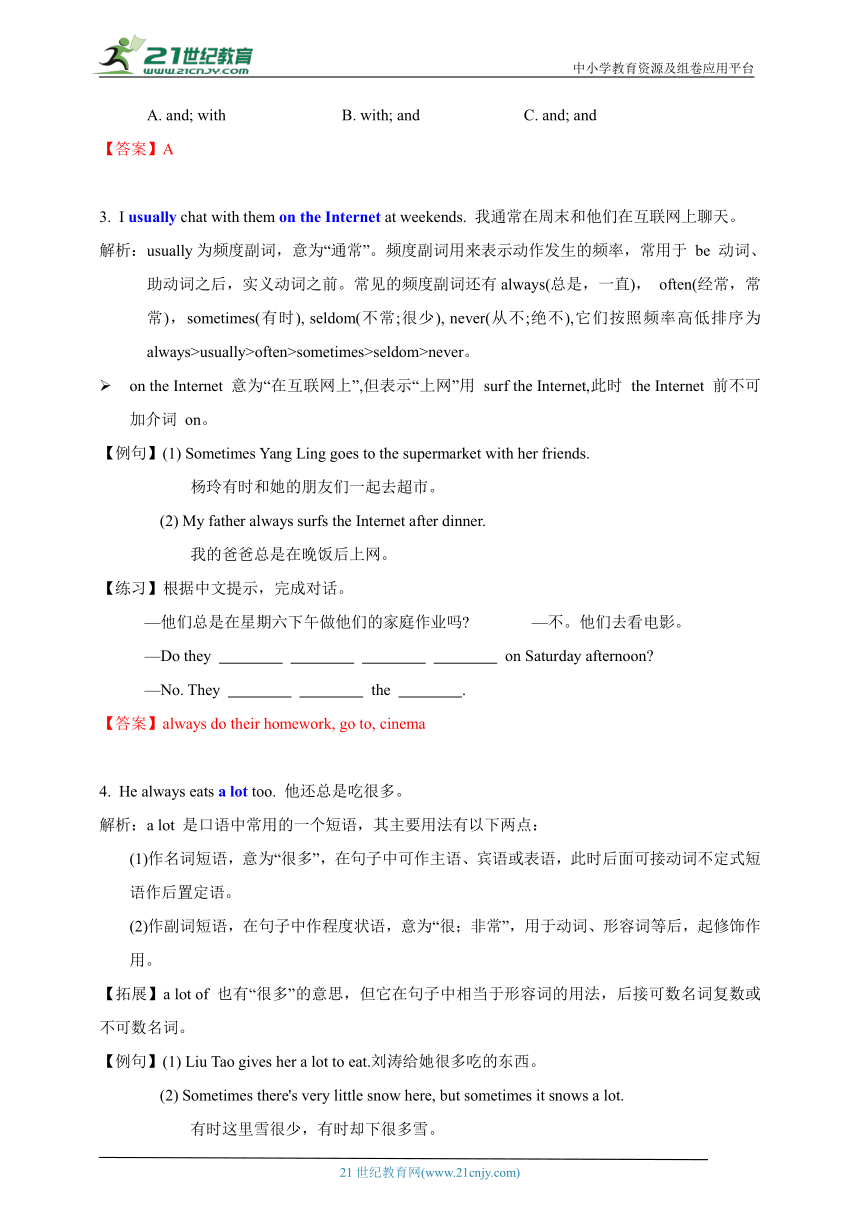Unit 7 At weekends重难知识点(复习讲义)-2023-2024学年五年级英语上册(译林版三起)
文档属性
| 名称 | Unit 7 At weekends重难知识点(复习讲义)-2023-2024学年五年级英语上册(译林版三起) |

|
|
| 格式 | doc | ||
| 文件大小 | 1.3MB | ||
| 资源类型 | 试卷 | ||
| 版本资源 | 牛津译林版 | ||
| 科目 | 英语 | ||
| 更新时间 | 2023-09-12 00:00:00 | ||
图片预览


文档简介
中小学教育资源及组卷应用平台
Unit 7 At weekends
重难点讲解 (含答案)
重难点讲解
What do you do at weekends, Su Hai 苏海,你在周末做什么
解析:句型“What do/does+主语+do+at weekends ”用来询问他人的周末活动,意为“……在周末做什么 ”。当主语为第三人称单数以外的其他人称时,助动词用 do;当主语为第三人称单数时,助动词用does。回答时可用“主语(+频度副词)+动词原形/动词第三人称单数形式+其他.”。
【例句】(1)—What do they do at weekends 他们在周末做什么
—They often help their parents in the garden.
他们经常在花园里给他们的父母帮忙。
(2)—What does Lily do at weekends 莉莉在周末做什么
—She usually stays at home and watches TV.她通常待在家里看电视。
【练习】选出句子中错误的一项,并在横线上改正。
( ) What do Liu Tao do at weekends
A B C
【答案】B does
Su Yang and I like playing with their cat Kitty very much.
我和苏洋非常喜欢和他们的猫凯蒂一起玩。
解析:play with 意为“和……一起玩”,后接名词或人称代词的宾格形式。
【拓展】with 和 and 都有“和”的意思,但在用法上有所不同。with 为介词,后接名词或人称代词的宾格形式,且紧接其后的成分不能在句子中作主语。and 为连词,用来连接两个并列的成分。当它连接同一个句子中的两个主语时,后面的谓语动词要用复数形式。
【例句】(1) I want to play with Bobby. 我想和波比一起玩。
(2) He goes to the park with his family. 他和他的家人一起去公园。
=He and his family go to the park. 他和他的家人去公园。
【练习】单项选择。
( ) My father I usually watch TV at weekends, but sometimes we play_the dog.
A. and; with B. with; and C. and; and
【答案】A
I usually chat with them on the Internet at weekends. 我通常在周末和他们在互联网上聊天。
解析:usually为频度副词,意为“通常”。频度副词用来表示动作发生的频率,常用于 be 动词、助动词之后,实义动词之前。常见的频度副词还有always(总是,一直), often(经常,常常),sometimes(有时), seldom(不常;很少), never(从不;绝不),它们按照频率高低排序为 always>usually>often>sometimes>seldom>never。
on the Internet 意为“在互联网上”,但表示“上网”用 surf the Internet,此时 the Internet 前不可加介词 on。
【例句】(1) Sometimes Yang Ling goes to the supermarket with her friends.
杨玲有时和她的朋友们一起去超市。
(2) My father always surfs the Internet after dinner.
我的爸爸总是在晚饭后上网。
【练习】根据中文提示,完成对话。
—他们总是在星期六下午做他们的家庭作业吗 —不。他们去看电影。
—Do they on Saturday afternoon
—No. They the .
【答案】always do their homework, go to, cinema
He always eats a lot too. 他还总是吃很多。
解析:a lot 是口语中常用的一个短语,其主要用法有以下两点:
(1)作名词短语,意为“很多”,在句子中可作主语、宾语或表语,此时后面可接动词不定式短语作后置定语。
(2)作副词短语,在句子中作程度状语,意为“很;非常”,用于动词、形容词等后,起修饰作用。
【拓展】a lot of 也有“很多”的意思,但它在句子中相当于形容词的用法,后接可数名词复数或不可数名词。
【例句】(1) Liu Tao gives her a lot to eat.刘涛给她很多吃的东西。
(2) Sometimes there's very little snow here, but sometimes it snows a lot.
有时这里雪很少,有时却下很多雪。
(3) The king has a lot of money/palaces now. He's very rich.
那位国王现在有很多钱/宫殿。他很富有。
【练习】单项选择。
( ) It usually rains here in summer.
A. lots of B. a lot C. lot of
【答案】B
Come out and play basketball, Billy! 比利,出来打篮球!
解析:come out意为“出来”,其同义短语为 get out。
【例句】(1) Sam, come out and have dinner with us. 山姆,出来和我们一起吃晚饭。
(2) The mouse can't get out of the bag because it eats a lot of rice.
那只老鼠没法从袋子里出来,因为它吃了很多大米。
【练习】根据中文提示,完成对话。
—请等一会儿。我十分钟内就出来。
—好的。
—Please a . I’ll in ten minutes.
—OK.
【答案】wait, minute, come out
易错易混全解
易混淆 and 与 with 的用法。
【例题】选词填空。
(1) These students often play football (and/with) their friends.
(2) Mike (and/with) Tim often draw pictures in the park.
【答案】(1) with (2) and
点拨:第(1)小题,设空处前为动词短语 play football,设空处要填的内容和后面的 their friends一起在动词短语后作状语,故填 with。第(2)小题,根据谓语动词 draw 可知,主语为复数,即 Mike 和 Tim 同为句子的主语,连接两个并列主语要用连词and,故填 and。
易混淆 a lot, a lot of 和 lots of 的用法。
【例题】单项选择。
( ) Jack knows about animals.
A. a lot of B. a lot C. lots of
【答案】B
点拨:a lot, a lot of 和 lots of 都译为“很多”,但三者在用法上有所不同。a lot可以在动词后作宾语,而 a lot of 和 lots of在句子中相当于形容词的用法,后接可数名词复数或不可数名词。本题设空处前为动词第三人称单数形式 knows,设空处要填的内容紧接其后作宾语。故选B。
HYPERLINK "http://21世纪教育网(www.21cnjy.com)
" 21世纪教育网(www.21cnjy.com)
Unit 7 At weekends
重难点讲解 (含答案)
重难点讲解
What do you do at weekends, Su Hai 苏海,你在周末做什么
解析:句型“What do/does+主语+do+at weekends ”用来询问他人的周末活动,意为“……在周末做什么 ”。当主语为第三人称单数以外的其他人称时,助动词用 do;当主语为第三人称单数时,助动词用does。回答时可用“主语(+频度副词)+动词原形/动词第三人称单数形式+其他.”。
【例句】(1)—What do they do at weekends 他们在周末做什么
—They often help their parents in the garden.
他们经常在花园里给他们的父母帮忙。
(2)—What does Lily do at weekends 莉莉在周末做什么
—She usually stays at home and watches TV.她通常待在家里看电视。
【练习】选出句子中错误的一项,并在横线上改正。
( ) What do Liu Tao do at weekends
A B C
【答案】B does
Su Yang and I like playing with their cat Kitty very much.
我和苏洋非常喜欢和他们的猫凯蒂一起玩。
解析:play with 意为“和……一起玩”,后接名词或人称代词的宾格形式。
【拓展】with 和 and 都有“和”的意思,但在用法上有所不同。with 为介词,后接名词或人称代词的宾格形式,且紧接其后的成分不能在句子中作主语。and 为连词,用来连接两个并列的成分。当它连接同一个句子中的两个主语时,后面的谓语动词要用复数形式。
【例句】(1) I want to play with Bobby. 我想和波比一起玩。
(2) He goes to the park with his family. 他和他的家人一起去公园。
=He and his family go to the park. 他和他的家人去公园。
【练习】单项选择。
( ) My father I usually watch TV at weekends, but sometimes we play_the dog.
A. and; with B. with; and C. and; and
【答案】A
I usually chat with them on the Internet at weekends. 我通常在周末和他们在互联网上聊天。
解析:usually为频度副词,意为“通常”。频度副词用来表示动作发生的频率,常用于 be 动词、助动词之后,实义动词之前。常见的频度副词还有always(总是,一直), often(经常,常常),sometimes(有时), seldom(不常;很少), never(从不;绝不),它们按照频率高低排序为 always>usually>often>sometimes>seldom>never。
on the Internet 意为“在互联网上”,但表示“上网”用 surf the Internet,此时 the Internet 前不可加介词 on。
【例句】(1) Sometimes Yang Ling goes to the supermarket with her friends.
杨玲有时和她的朋友们一起去超市。
(2) My father always surfs the Internet after dinner.
我的爸爸总是在晚饭后上网。
【练习】根据中文提示,完成对话。
—他们总是在星期六下午做他们的家庭作业吗 —不。他们去看电影。
—Do they on Saturday afternoon
—No. They the .
【答案】always do their homework, go to, cinema
He always eats a lot too. 他还总是吃很多。
解析:a lot 是口语中常用的一个短语,其主要用法有以下两点:
(1)作名词短语,意为“很多”,在句子中可作主语、宾语或表语,此时后面可接动词不定式短语作后置定语。
(2)作副词短语,在句子中作程度状语,意为“很;非常”,用于动词、形容词等后,起修饰作用。
【拓展】a lot of 也有“很多”的意思,但它在句子中相当于形容词的用法,后接可数名词复数或不可数名词。
【例句】(1) Liu Tao gives her a lot to eat.刘涛给她很多吃的东西。
(2) Sometimes there's very little snow here, but sometimes it snows a lot.
有时这里雪很少,有时却下很多雪。
(3) The king has a lot of money/palaces now. He's very rich.
那位国王现在有很多钱/宫殿。他很富有。
【练习】单项选择。
( ) It usually rains here in summer.
A. lots of B. a lot C. lot of
【答案】B
Come out and play basketball, Billy! 比利,出来打篮球!
解析:come out意为“出来”,其同义短语为 get out。
【例句】(1) Sam, come out and have dinner with us. 山姆,出来和我们一起吃晚饭。
(2) The mouse can't get out of the bag because it eats a lot of rice.
那只老鼠没法从袋子里出来,因为它吃了很多大米。
【练习】根据中文提示,完成对话。
—请等一会儿。我十分钟内就出来。
—好的。
—Please a . I’ll in ten minutes.
—OK.
【答案】wait, minute, come out
易错易混全解
易混淆 and 与 with 的用法。
【例题】选词填空。
(1) These students often play football (and/with) their friends.
(2) Mike (and/with) Tim often draw pictures in the park.
【答案】(1) with (2) and
点拨:第(1)小题,设空处前为动词短语 play football,设空处要填的内容和后面的 their friends一起在动词短语后作状语,故填 with。第(2)小题,根据谓语动词 draw 可知,主语为复数,即 Mike 和 Tim 同为句子的主语,连接两个并列主语要用连词and,故填 and。
易混淆 a lot, a lot of 和 lots of 的用法。
【例题】单项选择。
( ) Jack knows about animals.
A. a lot of B. a lot C. lots of
【答案】B
点拨:a lot, a lot of 和 lots of 都译为“很多”,但三者在用法上有所不同。a lot可以在动词后作宾语,而 a lot of 和 lots of在句子中相当于形容词的用法,后接可数名词复数或不可数名词。本题设空处前为动词第三人称单数形式 knows,设空处要填的内容紧接其后作宾语。故选B。
HYPERLINK "http://21世纪教育网(www.21cnjy.com)
" 21世纪教育网(www.21cnjy.com)
